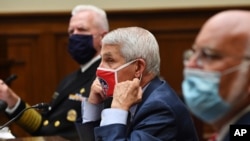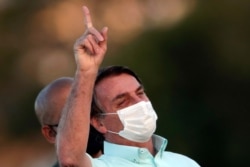The nation’s top infectious disease expert, Dr. Anthony Fauci, told lawmakers Friday on Capitol Hill he is “cautiously optimistic” a coronavirus vaccine would be available in the coming months, as infectious continue to rise at an alarming rate in the U.S.
“We hope at the time we get into the late fall and early winter, we will have in fact a vaccine that we can say will be safe and effective,” Fauci said before the House Select Subcommittee on the Coronavirus Crisis. “One can never guarantee the safety and effectiveness unless you do the trial, but we are cautiously optimistic.”
Fauci said a Phase 3 trial, the last phase of the vaccine approval process, recently got underway.
At the hearing’s open, panel chairman Democrat James Clyburn and the subcommittee’s ranking Republican, Steve Scalise, clashed over whether the Trump administration has a national strategy to contain the coronavirus crisis.
“The administration’s approach to deferring to states, sidelining experts and rushing to reopen has prolonged this virus and led to thousands of preventable deaths,” Clyburn said. “In fact, the United States response stands out as among the worst of any country in the world.”
WATCH Hearing
Scalise dismissed Clyburn’s assessment, arguing with a stack of documents in hand that the administration has, indeed, issued guidance to the country about how to contain the pandemic.
“These are just a few of the documents that your agencies have published to show states how to safely reopen, to show schools how to safely reopen, to show nursing homes how to care for their patients,” Scalise said to Fauci and the other government experts at the hearing.
“If all governors would have followed those guidelines, thousands more seniors in nursing homes would be alive today, if just five governors would have followed your plan that was developed President Trump,” Scalise added.
Robert Redfield, director of the Centers for Disease Control and Prevention (CDC) also testified Friday, saying it was in the “public health best interest” for K-12 schools to reopen.
He also discussed a decision by the Trump administration to direct all hospitals to send all coronavirus data to a database in Washington and thus passing the CDC. Redfield said he did not know of the decision until after it was made.
The hearing was held as the U.S. continues to lead the world in COVID-19 fatalities, with more than 153,000, about one-quarter of some 678,200 fatalities worldwide, according to Johns Hopkins University statistics.
With surges in southern, western and midwestern states, the U.S. also is home to a world-leading almost 4,558,994 confirmed cases — about one-fourth of the 17,507,359 cases worldwide.
A U.S. government report released Friday investigated how more than 260 people became infected with the coronavirus at a Georgia overnight camp last month. The report by the CDC and Georgia health officials said the camp took many precautions, including disinfecting and requiring staff to wear masks, but it did not make campers wear masks or ensure proper ventilation in the buildings.
In Brazil, recorded fatalities from COVID-19 surpassed Britain, making Brazil the country with the second-highest coronavirus death toll after the U.S.
Brazil’s death toll is 92,475, while Britain has recorded 46,204 deaths, according to a tally by Johns Hopkins University.
In Britain, Prime Minister Boris Johnson said Friday he was delaying plans to ease lockdown measures by at least two weeks after the country reported its highest number of new COVID cases since late June.
British Minister for Health and Social Care Matt Hancock said a second wave of the virus is rolling across Europe and that Britain must defend against it.
British authorities added Luxembourg to the country’s quarantine list, meaning travelers from there must isolate for 14 days after entering Britain. Spain, which had been dropped from the list, has been reinstated and other countries may be added.
In Brazil, President Jair Bolsonaro, who tested positive for the coronavirus on July 7 and then negative last Saturday, said that after 20 days indoors he had mold on his lungs. He is being treated with antibiotics. He had repeatedly referred to COVID-19 as “a little flu.”
Among the confirmed cases is Brazil’s first lady, Michelle Bolsonaro, who tested positive on Thursday, according to a statement from the presidential palace. Science and Technology Minister Marcos Pontes also said he had tested positive for the virus, making him the fifth cabinet minister diagnosed publicly.
Botswana’s capital, Gaborone, reimposed a two-week lockdown on Thursday after a surge in new confirmed COVID-19 cases. The increase came as the WHO warned against easing coronavirus restrictions throughout Africa. The WHO says the number of infections on the continent has doubled in the past month.
“We are concerned that ... we will see an increase in cases as we have seen in [other] countries” where restrictions have been eased too soon,” WHO Regional Director for Africa Matshidiso Moeti said.
She said more than 20 African countries have recorded more new cases than in the previous weeks, with South Africa accounting for the most but increases also reported in Kenya, Madagascar, Nigeria, Zambia and Zimbabwe.
Moeti said Uganda, Seychelles and Mauritius are doing well in controlling the virus.









